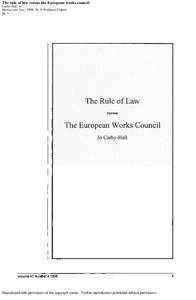The rule of law versus the European Works Council

1998
40
4
1-41
equal employment opportunity ; EU Directive ; European works council ; implementation ; labour relations ; labour law ; multinational enterprise ; workers participation ; workers representation
Workers participation and European works councils
http://dx.doi.org/10.1108/03090559810770079
English
Bibliogr.
"Focuses on two key aspects of the rule of law – equality before the law and the universal application of the same system of law to all people – and examines these requirements in the context of the European Works Council (EWC) Directive, aimed at establishing a European?wide legal framework for transnational information and consultation. Looks at the philosophy behind the EWC concept, discussing its historical context, the rationale for its adoption, its provisions and certain implementation problems, and considers the implications and consequences of the Directive for the UK, which is in the process of adopting it. Spotlights three problematic areas relating to recognition and employee representation, the potential consequences of late implementation and uniting different employee representative arrangements, and identifies three aspects of inequality relating to both employers and employees that appear to breach the rule of law. Concludes that the Directive represents a first step towards achieving true employee participation and a transnational industrial relations system."
Digital
The ETUI is co-funded by the European Union. Views and opinions expressed are however those of the author(s) only and do not necessarily reflect those of the European Union or the ETUI.